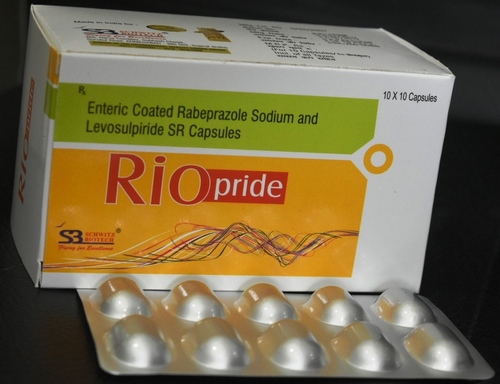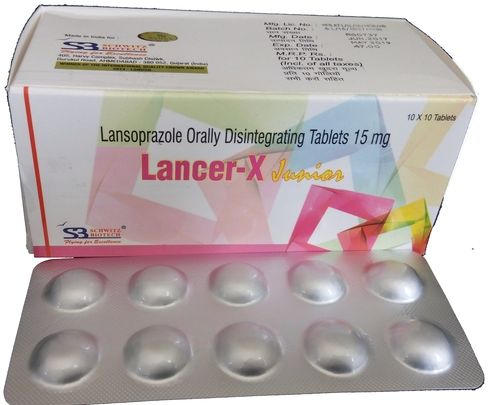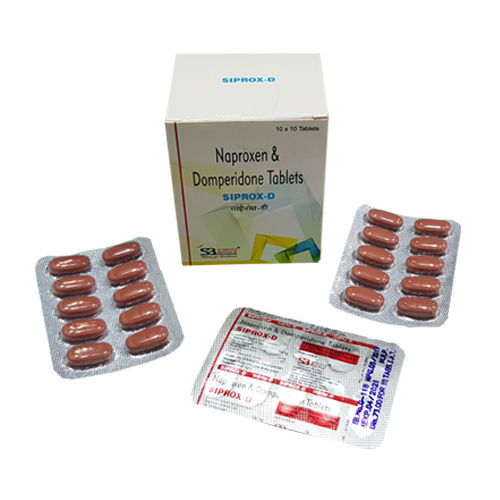
Rabeprazole 20 mg + Levosulpiride (SR) 75 mg Capsules
1180 INR/Box
Product Details:
X
Rabeprazole 20 mg + Levosulpiride (SR) 75 mg Capsules Price And Quantity
- 100 Box
- 1180 INR/Box
Rabeprazole 20 mg + Levosulpiride (SR) 75 mg Capsules Trade Information
- Mundra and Mumbai
- Cash Advance (CA) Cash in Advance (CID)
- 100 Box Per Day
- 3-30 Days
- Yes
- Sample costs shipping and taxes has to be paid by the buyer
- Box, Carton
- Asia Eastern Europe Western Europe Africa Central America Middle East South America North America Australia
- All India
Product Description
RioPride is a combination medicine that comes in a pack containing 10x10 capsules.
Mechanism of Action:
Rabeprazole is a type of antisecretory compound that does not possess anticholinergic, histamine H2 receptor antagonist properties. Moreover, it inhibits the gastric H+/K+ATPase (hydrogen-potassium adenosine triphosphatase) at the secretory surface of the parietal cells to suppress gastric acid secretion. As this enzyme is thought to act as the acid (proton) pump within the parietal cell, rabeprazole has been described as an inhibitor of gastric proton-pump activity. Rabeprazole blocks gastric acid secretion at the final stage. As rabeprazole is protonated, it accumulates in gastric parietal cells and is converted to an active sulfenamide.
Levosulpiride is primarily a dopamine D2 antagonist and is more selective. Levosulpiride exerts its prokinetic effect through the blockade of dopamine D2 inhibitory receptors on enteric (neuronal and muscular) cells. Furthermore, levosulpiride acts moderately as an agonist at 5-HT receptors. Levosulpiride may have an enhanced therapeutic effect on gastrointestinal disorders when it contains the serotonergic (5-HT4) component. Due to this property and the antagonistic effect on D2-receptors, it may produce its gastrointestinal prokinetic effect.
Indications:
1. Treating or healing ulcerative or erosive gastroesophageal reflux disease.
2. Maintaining healing of erosive or ulcerative GERD
3. Healing of Duodenal Ulcers
4. Management of pathological hypersecretory conditions, including Zollinger-Ellison syndrome
5. Chronic Gastritis
6. Irritable bowel syndrome
Drug Interactions:
1. If anticholinergic drugs are taken together with Levosulpiride, it's gastroprokinetic efficacy can be decreased.
2. Drug interactions with psychopharmaceuticals should be studied carefully and monitored to avoid unexpected and undesired effects.
3. In high doses, hyperprolactinemia can occur, so special control during treatment is advised.
4. Rabeprazole causes a significant increase in gastric pH, which may adversely affect drugs like ketoconazole and digoxin that rely on pH for absorption.
When taken simultaneously, ketoconazole levels are reduced by 33% and digoxin trough levels are increased by up to 22%.
Mechanism of Action:
Rabeprazole is a type of antisecretory compound that does not possess anticholinergic, histamine H2 receptor antagonist properties. Moreover, it inhibits the gastric H+/K+ATPase (hydrogen-potassium adenosine triphosphatase) at the secretory surface of the parietal cells to suppress gastric acid secretion. As this enzyme is thought to act as the acid (proton) pump within the parietal cell, rabeprazole has been described as an inhibitor of gastric proton-pump activity. Rabeprazole blocks gastric acid secretion at the final stage. As rabeprazole is protonated, it accumulates in gastric parietal cells and is converted to an active sulfenamide.
Levosulpiride is primarily a dopamine D2 antagonist and is more selective. Levosulpiride exerts its prokinetic effect through the blockade of dopamine D2 inhibitory receptors on enteric (neuronal and muscular) cells. Furthermore, levosulpiride acts moderately as an agonist at 5-HT receptors. Levosulpiride may have an enhanced therapeutic effect on gastrointestinal disorders when it contains the serotonergic (5-HT4) component. Due to this property and the antagonistic effect on D2-receptors, it may produce its gastrointestinal prokinetic effect.
Indications:
1. Treating or healing ulcerative or erosive gastroesophageal reflux disease.
2. Maintaining healing of erosive or ulcerative GERD
3. Healing of Duodenal Ulcers
4. Management of pathological hypersecretory conditions, including Zollinger-Ellison syndrome
5. Chronic Gastritis
6. Irritable bowel syndrome
Drug Interactions:
1. If anticholinergic drugs are taken together with Levosulpiride, it's gastroprokinetic efficacy can be decreased.
2. Drug interactions with psychopharmaceuticals should be studied carefully and monitored to avoid unexpected and undesired effects.
3. In high doses, hyperprolactinemia can occur, so special control during treatment is advised.
4. Rabeprazole causes a significant increase in gastric pH, which may adversely affect drugs like ketoconazole and digoxin that rely on pH for absorption.
When taken simultaneously, ketoconazole levels are reduced by 33% and digoxin trough levels are increased by up to 22%.
Enter Buying Requirement Details
Other Products in 'Antacids, Anti-Ulcerants & Laxatives Medicines' category
 |
SCHWITZ BIOTECH
All Rights Reserved.(Terms of Use) Developed and Managed by Infocom Network Private Limited. |

 English
English Spanish
Spanish French
French German
German Italian
Italian Chinese (Simplified)
Chinese (Simplified) Japanese
Japanese Korean
Korean Arabic
Arabic Portuguese
Portuguese





